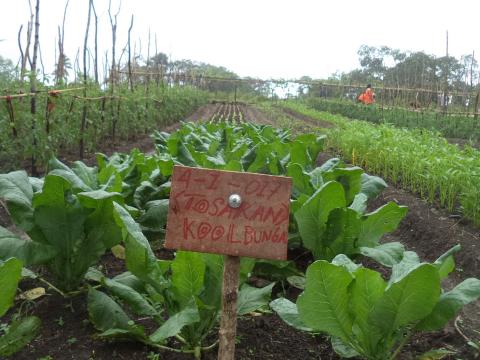Flow-on effects of increased incomes help families flourish

The flow-on effects of a higher income are plentiful. An increased ability to purchase nutritious food, to improve housing conditions and the means to send children to school are just a few. Beneficiaries of the World Vision Baucau Community Economic Development (CED) Project are experiencing many of the benefits of increased incomes.
Starting in October 2012, the CED project aimed to strengthen economic opportunities through training, market research and developing beneficiary groups to increase farmers’ resilience and improve their collective production, market access and financial literacy.
The leader of the farmers group RAI MEAN, Alberto Magno Da Silva Mau Naha said, “Our group was established in 2012 and has continued to function until now. We are cultivating tomatoes, vegetables, lettuce, sweet potatoes and cauliflower. The goal of growing vegetables or becoming farmers is to increase our family income and if we have excess income, it can be used to pay for our children to go to school,” said Mau Naha.
Alberto, RAI MEAN group leader has grown vegetables for his family and group's income, Photo: Jose da Silva / World Vision
As part of the project, World Vision created market collection centres where agricultural groups sell their products. Larger quantities of produce are sold at the national market.
Mau Naha said World Vision connected them to the DILI MART Supermarket. Every week representatives from the supermarket purchase agricultural products from the Bucoli Collection Centre in Baucau.
Through selling their products at these market collection centres, the groups are now earning more which helps them meet their families’ needs.
The recent CED project evaluation showed the proportion of households benefitting from the project who earn an annual income above USD$350 has increased by over 50% since it started in 2012.
World Vision Baucau Area Manager, Junilda Maria Vilanova, said, “Over the life of the project, World Vision helped facilitate relationships which have resulted in increased incomes. These connections will continue to be fruitful into the future. Sustainability is key.”
HAFUCO small-scale industry’s group leader, Maria Idalina da Costa Tilman, said they have produced cassava chips from local foods and others such as taro, sweet potato and banana. They also have other activities in the agricultural sector focused on nurseries which are producing lemons, mangoes and jackfruit.
“The products sell for around USD$1 per 200g and the group has been earning around USD$30 per day. Our sales distribution system includes small kiosks, stores and we also sell directly to homes and schools. When there is an exhibition, we bring our products along,” said Tilman.
HAFOCU group fills, wraps, and laminates plastic bags using a manual machine for Banana crackers, Photo: Jaime dos Reis / World Vision
Tilman said their group has benefited from the CED project. Some groups lend money to members to construct houses as well as paying school fees for their children.
World Vision’s Resilience and Livelihoods Technical Advisor for the Pacific & Timor-Leste, Dr Adam Trau, shared, “The Baucau CED project successfully connected farmers to markets to sell their products, including with big supermarkets in the capital Dili. Through better understanding of market requirements, engaging in collective selling, and improving negotiation skills, farmers now receive better prices for their products. The project evaluation found that only 44.7% of producers were satisfied with their price at the start of the project, compared to an impressive 88.5% at project end. Higher incomes mean parents are better able to provide for their children. The evaluation found that there was a sizeable increase in the number of households increasing the quantity of food provided to their children including providing more vegetables.”
As part of the project, World Vision also created a savings and loans program for agricultural and small-scale industry groups as part of the CED project.
Another beneficiary from HIKIS KOSAR’s savings and loans group, Maria Santina Ximenes, said World Vision provided them with administrative and financial training.
Odelia (left) gives a check book to Maria Santina Ximenes (right) for signing in order to deposit her montly charging money, Photo: Jaime dos Reis / World Vision
"In 2016 our group capital was USD$2,000. The capital increased to USD$8,000 the next year, "said Ximenes.
Ximenes said the group’s income stems from various sources including horticultural sales and interest earnt from providing loans. Group members are charged 5% interest for a three-month lending period while loans provided to the broader community earn 10% interest for the group.
Women are having more of a say in household financial decisions due to their involvement in the project. The evaluation revealed that at the beginning of the project both men and women had a say in household expenditure in less than 2% of households compared to 62% of households at end of the project.
The CED project supports the Timor-Leste government’s goals to undertake economic diversification to help achieve the national strategic development plan goals for 2030.
The World Vision Baucau Community Economic Development project, funded by the Australian NGO Cooperation Program (ANCP) under the Australia Department of Foreign Affairs and Trade (DFAT), ended in June 2017. The project reached 21,926 people in 66 communities in Baucau, Timor-Leste.


